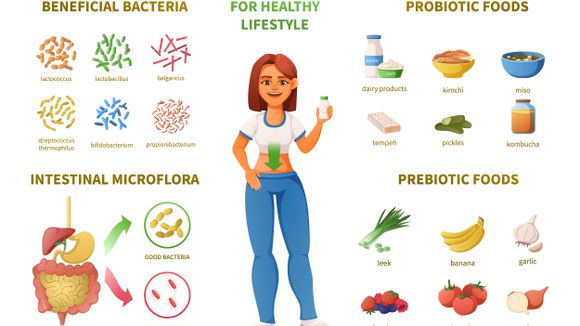What are probiotics and prebiotics?
Both prebiotics and probiotics are important for human health. However, they have different functions in the body, namely:
- Probiotics are live bacteria found in certain foods or supplements. They can provide numerous health benefits related to weight, immune function, regulation of neurotransmitters and hormones, appetite, and others.
- Prebiotics are substances that come from types of carbohydrates (mostly fiber) that people cannot digest. Beneficial bacteria in the intestine feed on these fibers, therefore they are called prebiotics.
Intestinal bacteria, collectively called intestinal flora or intestinal microbiota, perform many important functions in the body associated with regulating metabolism, hormonal balance, optimal weight, and protection from pathogenic microorganisms.
Therefore, eating foods with balanced amounts of probiotics and prebiotics can help ensure the right balance of these bacteria to keep your gut microbiota healthy and strong. [Ref. 1]
Why are gut bacteria important?
Good bacteria in the digestive tract help protect you from harmful bacteria, yeast, and fungi. A 2013 study on gut bacteria confirmed that a wide variety of this beneficial type of bacteria can help with immune system functions, improve symptoms of depression and help tackle obesity, among other benefits. [2]
Other recent studies examine the properties of probiotics and prebiotics to help maintain the integrity of the mucous barrier, to provide nutrients such as vitamins or to protect against pathogens. [3] [4]
In addition, some of your gut bacteria form vitamin K and short-chain fatty acids. Short-chain fatty acids are the main source of nutrients for cells covering the large intestine. They promote a strong intestinal barrier that protects against harmful substances, viruses, and bacteria. This also helps reduce inflammation and may have the potential to reduce the risk of cancer. For example, intestinal bacterial butyrate and propionate are capable of inhibiting histone deacetylases of host tumor cells with a common anticancer effect [5]
Which foods are rich in prebiotics?
Many foods contain natural prebiotics. They are types of fiber found in vegetables, fruits, and legumes. People are not able to digest these types of fiber, but beneficial intestinal bacteria can digest them. Foods high in prebiotic fiber include:
- Legumes, beans, and peas
- Oatmeal
- Bananas
- Berries
- Asparagus
- Garlic
- Leek
- Onion
Which foods are rich in probiotics?
There are also many probiotic foods that naturally contain beneficial bacteria, such as yogurt. High-quality plain yogurt with live crops can be a fantastic addition to your diet if you want to provide beneficial bacteria.
Fermented foods are another great option as they contain beneficial bacteria that develop thanks to naturally occurring sugar or fiber in food. Examples of fermented foods include:
- Sauerkraut
- Kimchi
- Kombucha tea
- Kefir (milk and non-dairy)
- Certain types of pickles (unpasteurized)
- Other marinated vegetables (unpasteurized)










